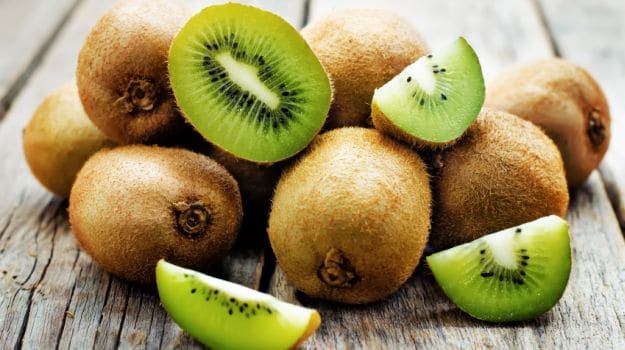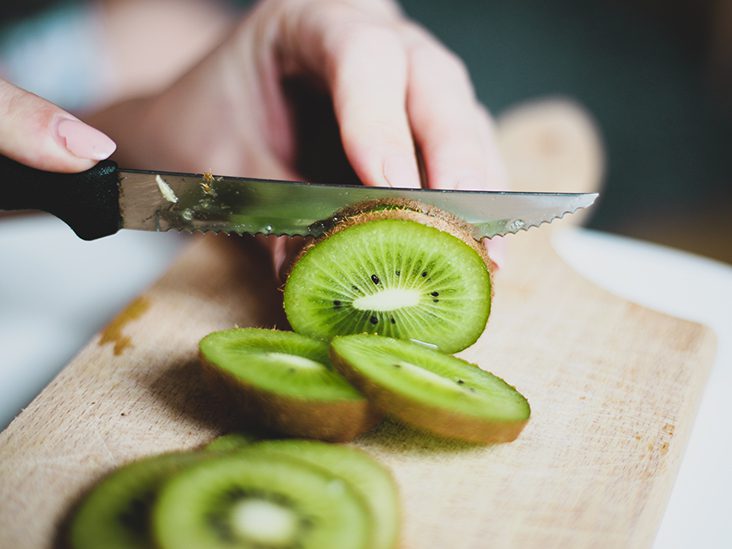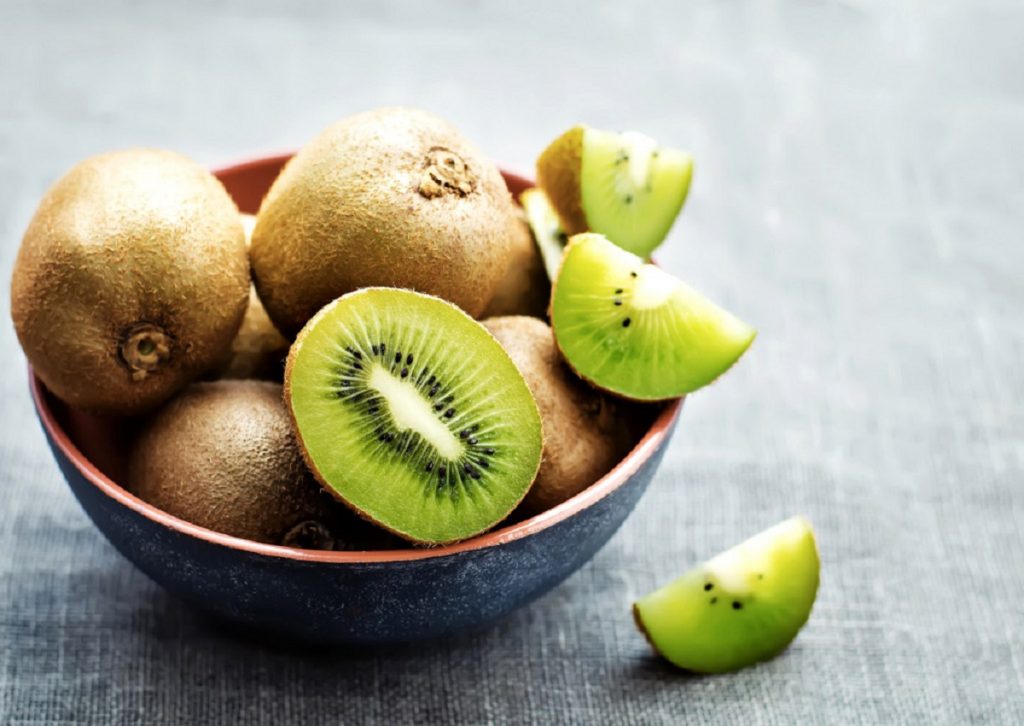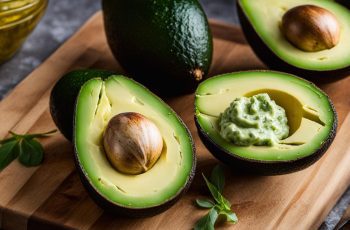
Kiwis are hardy fruit that can be found year-round in supermarkets. From November to May, they are grown in California, and from June to October, they are grown in New Zealand. There are 50 different varieties of the fruit, each with a unique flavor and use, and the flesh can range from a golden custard to bright pink.
Why is a Kiwi the best fruit?
Kiwi fruit isn’t often referred to as a “superfood,” but it’s a fruit that is packed with essential vitamins and minerals and can have a positive impact on your health. These fuzzy brown fruits have a sweet and slightly tangy taste with green flesh that lends a unique flavor and tropical zing. In addition, the kiwi fruit has a wide variety of vitamins and minerals. These include antioxidants like vitamin C, folate, copper, and potassium, and vitamins E and K. The skin and the seeds can be eaten. Still, many people prefer to remove the fuzzy skin.
Nutritional Value:

Kiwis are known for their high levels of vitamin C, but that’s not all this fruit has. Vitamins, minerals, and other nutrients can be found in this low-calorie fruit, which has just 61 calories per 100g serving.
- 9 g sugar
- 3g dietary fiber
- 1.1g protein
- 61 calories
- 0.5 g fat
- 3 mg sodium
- 15 g carbohydrates
Known as ascorbic acid, this vitamin is essential for the growth and repair of tissues in the body. Vitamin K is also found in kiwis, making them an excellent mineral source. Blood clotting, metabolism, and calcium levels are all regulated by Vitamin K, a fat-soluble vitamin. As a fruit, the amount of vitamin K found in kiwi fruit is quite remarkable at 40mcg per cup.
Red blood cells are formed when copper and iron work together. Copper also supports healthy bones and nerves and helps iron absorption. Kiwis contain 14 percent of your recommended daily copper intake, making them an excellent source. In addition, folate, potassium, and dietary fiber are all reasonably present in kiwis.
Proven Health Benefits of Kiwi Fruit

1. Prevents Blood Clotting
Kiwis have been shown to reduce the amount of fat in the blood, preventing blood clotting and lowering blood pressure. In addition, it was discovered that this did not adversely affect blood cholesterol levels.
Cardiovascular disease patients have usually prescribed aspirin as a preventative measure. In the gastrointestinal tract, however, aspirin can cause inflammation and ulcers.
Kiwi fruit can be substituted for daily aspirin consumption to help thin the blood and improve heart health over some time, according to studies.
2. Can Help Asthma
Asthma can potentially be highly debilitating for those suffering from it. Wheezing and shortness of breath are among the most common symptoms of this illness.
Symptoms of asthma can be alleviated by kiwis’ high levels of vitamin C and antioxidants. In addition, according to a study, people who eat Kiwi regularly have better lung function.
3. Enhances Digestion
Improved digestion can be achieved with the help of Kiwi’s high fiber content. This enzyme, actinic, is found in kiwi fruit and helps break down proteins in the intestine.
To help break down the tough proteins in meat and fish that can cause bloating, a kiwi is recommended afterward. Also, if you’re having trouble digesting food, kiwis may help.
4. Helps Regulate Blood Pressure
New Zealanders can help lower blood pressure and prevent heart disease and stroke. For example, kiwis have been shown to lower blood pressure in those who eat three per day for eight weeks.
Lutein, an antioxidant found in kiwi fruit, is thought to be responsible for the fruit’s blood pressure-lowering properties. Additionally, kiwis are rich in vitamin C, which can lower blood pressure.
5. Promotes Immune Function
Defending the body’s cells from the effects of free radicals is an essential role of vitamin C. Growth and repair of tissues, as well as support for the immune system, are facilitated by this protein.
You can boost your immune system with kiwis’ high vitamin C content. Eat kiwis regularly to prevent the common cold and flu because they contain 103 percent of your recommended daily vitamin C intake.
6. Decreases DNA Damage
Deficiencies in antioxidants and free radicals cause oxidative stress, which can eventually lead to disease. In addition, DNA strands can be broken due to this process. This can cause various health issues, some of which are difficult to detect or treat.
Antioxidants found in kiwi fruit can help reduce oxidative stress. When peroxide was applied to people’s cells, those who took kiwi supplements showed an improved ability to repair their DNA after it was used. So, Kiwis could help prevent chronic cancers and lifestyle diseases like colon cancer, which is linked to DNA damage.
7. Prevents Vision Loss
Kiwis can prevent macular degeneration and eventual vision loss. This is because zeaxanthin and lutein (the “eye vitamin”) is found in kiwi fruit.
Vitamin A, an essential nutrient for your eyes, is made by combining these two compounds. In addition, they reduce the amount of light that reaches our eyes, preventing damage to our retinas and other eye diseases.
Your retina, which contains the most nerves and serves as the eye’s communication hub, can benefit from a well-functioning nervous system. In addition, copper, an essential nutrient for the nervous system, is also found in kiwis, supporting the eye’s ability to function correctly.
8. Fights Inflammation
Kiwi, pineapple, and green papaya are all sources of bromelain—an enzyme that can break down proteins and reduce inflammation. Bromelain, a digestive enzyme found in kiwis, is released into the bloodstream after consumption, where it helps break down inflammatory compounds.
People living with Arthritis may also benefit from the anti-inflammatory properties of Kiwi.
Free radicals, which can trigger an inflammatory response in the body, are combated by vitamin C, which has high levels of antioxidants. Therefore, the high concentration of vitamin C in kiwis can aid in healing for those who regularly consume the fruit.
9. Enhances Skin Health
The skin and bones both benefit from collagen, an essential nutrient. The body’s collagen synthesizing relies heavily on kiwis’ vitamin C. You can keep your skin hydrated and healthy by consuming kiwi fruit, which supports the structure of your skin.
Acne is a skin condition that can lead to unsightly pimples on the face and other body parts. Acne sufferers can benefit from the anti-inflammatory properties and vitamin C in kiwis, significantly reducing sebum production in pores.
For best results, apply kiwi extract mixed with aloe vera to your skin and leave it overnight.
Kiwi Fruit for Weight Loss

When it comes to losing weight, kiwis are among the best fruits. In addition to their high water content and low caloric content, cucumbers also contain a significant amount of fiber. This makes them ideal for a snack or a smoothie in the morning.
Kiwi fruit has a high concentration of vitamin C, which is the key to its ability to aid in weight loss. Dietary intake of vitamin C has been shown to reduce hypertension, improve cholesterol levels, and improve immune function. It also plays a crucial role in the breakdown of fat. An effective weight loss plan takes into account all of these considerations.
A lower glycemic index (GI) means that the sugar in kiwis is released more gradually. Kiwis can also help regulate blood sugar levels, reducing irregular blood sugar spikes. In addition, dietary fiber-rich foods increase feelings of satiety and support the digestive system, contributing to weight loss.
Insoluble and soluble fibers are both present in kiwis. The seeds’ insoluble fiber adds bulk to the stool and promotes movement through the digestive system. The soluble fiber’s gel-like substance reduces bile acid and blood cholesterol levels. Both of these kinds of fiber benefit the digestive system and help dieters avoid overeating.
A powerful antioxidant, actinidin, can be found in kiwis. A sluggish digestive system can benefit greatly from the help of this antioxidant while dieting. In addition, people with irritable bowel syndrome may benefit from this supplement.
Conclusion
Kiwis are not only delicious in fruit salads and smoothies but are also a good source of numerous nutrients and enzymes, as well as antioxidants and dietary fiber. We need these nutrients to maintain good health and optimal bodily function. In addition, the vitamin C content of kiwis is much higher than that of an orange. As a result, kiwis can help boost the immune system, regulate blood pressure, and even alleviate symptoms like asthma and macular degeneration.
Additionally, Kiwi is rich in bromelain, an enzyme that can reduce inflammation and improve digestion in the body. Kiwi is low in calories, high in fiber, and contains protein, digestive enzymes, and vitamin C, which means it can effectively promote weight loss.
The cardiovascular and digestive health benefits of eating a couple of kiwis can’t be overstated. So make a daily smoothie or small snack out of kiwis and see how it improves your health.
FAQs (Frequently Asked Questions)
Q: What are some interesting facts about kiwi fruit?
- Nutritionally, kiwi fruits are similar to bananas in potassium and Vitamin C, but they also have a higher amount than oranges. Flavonoids, vitamins A and E, and minerals abound in this superfood. The kiwi fruit contains twice as much Vitamin E as an avocado but only has 60% of the calories of an avocado.?
- It’s low in calories, even though it’s a little sweet.
- The fiber content of kiwi fruits is high.
- Kiwifruits are a popular ingredient in DIY face masks among health and beauty enthusiasts. Vitamins C, E, and K are found in abundance in kiwis. In addition, exfoliation, nourishment, and anti-aging properties are all provided by kiwis.
- The kiwifruit was initially referred to as the ‘Chinese Gooseberry’ because it originated in China. However, the name had to be changed due to its association with the Cold War.
- The ‘fuzzy brown kiwi’ – New Zealand’s National Bird – inspired the kiwifruit’s name, which translates to ‘kiwi fruit.’
- Pregnant women are encouraged to eat kiwifruits because they contain up to 10% of the recommended daily folate intake.
- The potassium in kiwifruit helps lower blood pressure. One large kiwi, or a 100-gram serving of kiwifruit, provides 15% of the daily recommended potassium intake.
Q: Do you eat kiwi fruit with skin or without?
Yes! The kiwi’s brown and fuzzy skin is edible to the fullest extent. At first glance, the texture may seem strange, but it is very similar to the skin of a peach or an apple.
There are numerous advantages to eating a kiwi with the skin still on it. To begin with, many people find that eating the kiwifruit with the skin on it is a lot less messy than eating it without. This is due to the skin’s role in keeping the fruit’s flesh together after slicing it.
The skin of the kiwifruit is the most nutritious part of the fruit, making it easier to eat. Vitamin C and fiber are abundant in the flesh of the kiwifruit, which can help prevent disease and the aging process. However, it is the kiwi’s skin that aids in the preservation of the fruit’s nutrients and vitamins.




